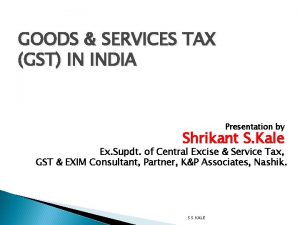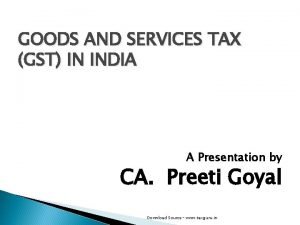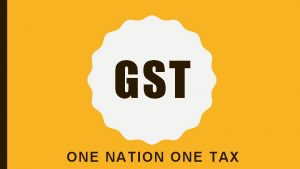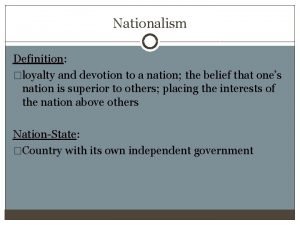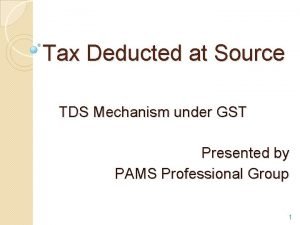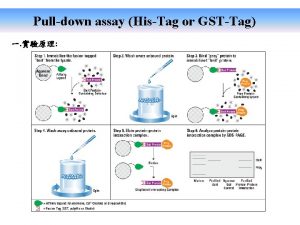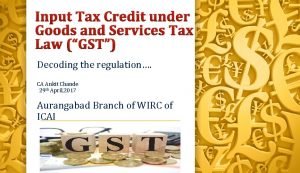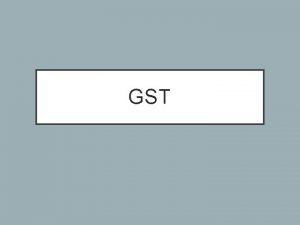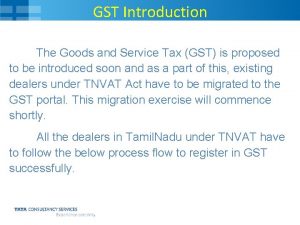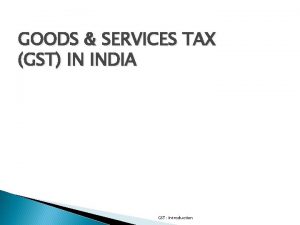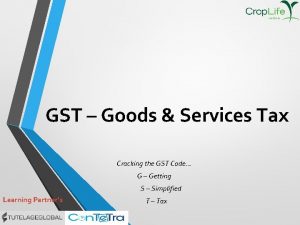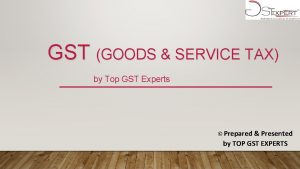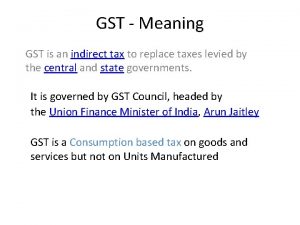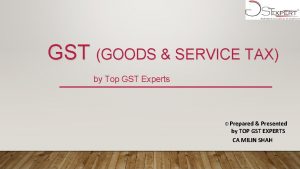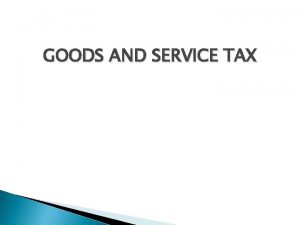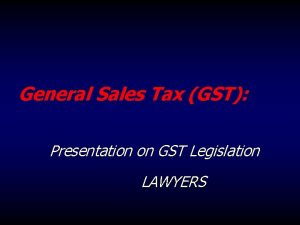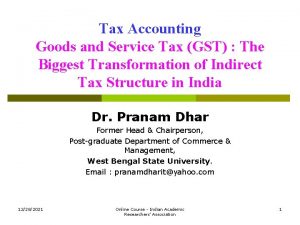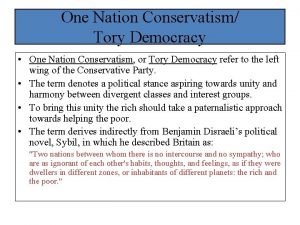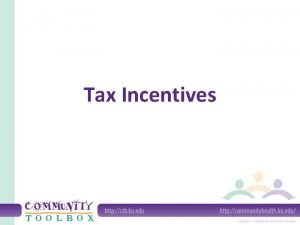GST ONE NATION ONE TAX INTRODUCTION OF GST
















- Slides: 16

GST ONE NATION ONE TAX

INTRODUCTION OF GST • GST (Goods and Services Tax) is a comprehensive Indirect Tax. • GST will replace all the other center GOVT. s Indirect taxes like States VAT, Service Tax, Central Excise Duty, Central Sales Tax, Purchase Tax, Entertainment Tax etc. • It was introduced as The Constitution (One Hundred and First Amendment) Act 2016, following the passage of Constitution 122 st Amendment Bill. • The Small business having turnover up to Rs. 20 Lakhs are exempted from GST under. All the other taxpayer having the turnover of more than Rs. 20 Lakhs (Rs 10 Lakhs in northeast States) are required to register and pay GST.

TAX RATES • GST has Four Types Of Tax Rate Slabs 1. 5% (Most Of Transportation) 2. 12% ( Air other than Economy Class, Non- Ac Restaurants, Renting Etc. ) 3. 18% (AC Restaurants, Drinking Etc. ) 4. 28% ( 5 - Star Hotels, Gambling Etc. ) • Fifth category of Exempted items like Education, Health Care, Grain Items etc. Note: All other items not mentioned in Councils List will lie in the 18% slab.

10 MOST IMPORTANT TALKIES ABOUT G. S. T 1 st. Officially, the Constitution (One Hundred and Twenty-Second Amendment) Bill 2014. 2 nd. It was introduced in the Lok Sabha on December 19, 2014 by Finance Minister Arun Jaitley.

10 MOST IMPORTANT TALKIES ABOUT G. S. T 3 rd. The Bill seeks to Amend the Constitution to introduce a goods and services tax (GST) which will subsumes various Central indirect taxes, including the Central Excise Duty, Countervailing Duty, Service Tax, etc. It also subsumes State value added tax (VAT), octroi and entry tax, luxury tax, etc.

10 MOST IMPORTANT TALKIES ABOUT G. S. T 4 th. The Bill inserts a new Article in the Constitution make legislation on the taxation of goods and services a concurrent power of the Centre and the States.

10 MOST IMPORTANT TALKIES ABOUT G. S. T 5 th. The Bill seeks to shift restriction on States for taxing sale or purchase of goods to supply of goods or services. the the

10 MOST IMPORTANT TALKIES ABOUT G. S. T 6 th. The Bill seeks to establish a GST Council tasked with optimising tax collection for goods and services by the State and Centre. The Council will consist of the Union Finance Minister (as Chairman), the Union Minister of State in charge of revenue or Finance, and the Minister in charge of Finance or Taxation or any other, nominated by each State government.

10 MOST IMPORTANT TALKIES ABOUT G. S. T 7 th The GST Council will be the body that decides which taxes levied by the Centre, States and local bodies will go into the GST; which goods and services will be subjected to GST; and the basis and the rates at which GST will be applied.

10 MOST IMPORTANT TALKIES ABOUT G. S. T 8 th Under the Bill, alcoholic liquor for human consumption is exempted from GST. Also, it will be up to the GST Council to decide when GST would be levied on various categories of fuel, including crude oil and petrol.

10 MOST IMPORTANT TALKIES ABOUT G. S. T 9 th The Centre will levy an additional one per cent tax on the supply of goods in the course of inter-State trade, which will go to the States for two years or till when the GST Council decides.

10 MOST IMPORTANT TALKIES ABOUT G. S. T 10 th Parliament can decide on compensating States for up to a fiveyear period if States incur losses by implementation of GST.

GST WILL DIGEST THE TAXES At the Central level, 1. Central Excise Duty, 2. Additional Excise Duty, 3. Service Tax, 4. Additional Customs Duty commonly known as Countervailing Duty, and 5. Special Additional Duty of Customs.

GST WILL DIGEST THE TAXES At the State level 1. Subsuming of State Value Added Tax/Sales Tax, 2. Entertainment Tax, 3. Octroi and Entry tax, 4. Purchase Tax, 5. Luxury tax, and 6. Taxes on lottery, betting and gambling.

TO KNOW MORE VISIT MY BLOG eshehwazblog

THANK YOU FOR WATCHING MY VIDEO FOR MORE UPDATE SUBSCRIBE MY CHANNEL STOP HERE!
 Importance of gst
Importance of gst Example of nation
Example of nation State vs nation
State vs nation State vs nation
State vs nation Conclusion on gst
Conclusion on gst Ralphs annual income is about $32 000
Ralphs annual income is about $32 000 We are one nation yes we are one land
We are one nation yes we are one land Introduction of gst
Introduction of gst Loyalty and devotion towards a nation
Loyalty and devotion towards a nation Nation born in a day
Nation born in a day What is utr in gst
What is utr in gst Gst deduction at source
Gst deduction at source Annexure b for gst refund
Annexure b for gst refund Gst pull down
Gst pull down Gst 105 use of english pdf
Gst 105 use of english pdf Philosophy and human existence gst 113
Philosophy and human existence gst 113 Section 18(1)(c) of gst
Section 18(1)(c) of gst
